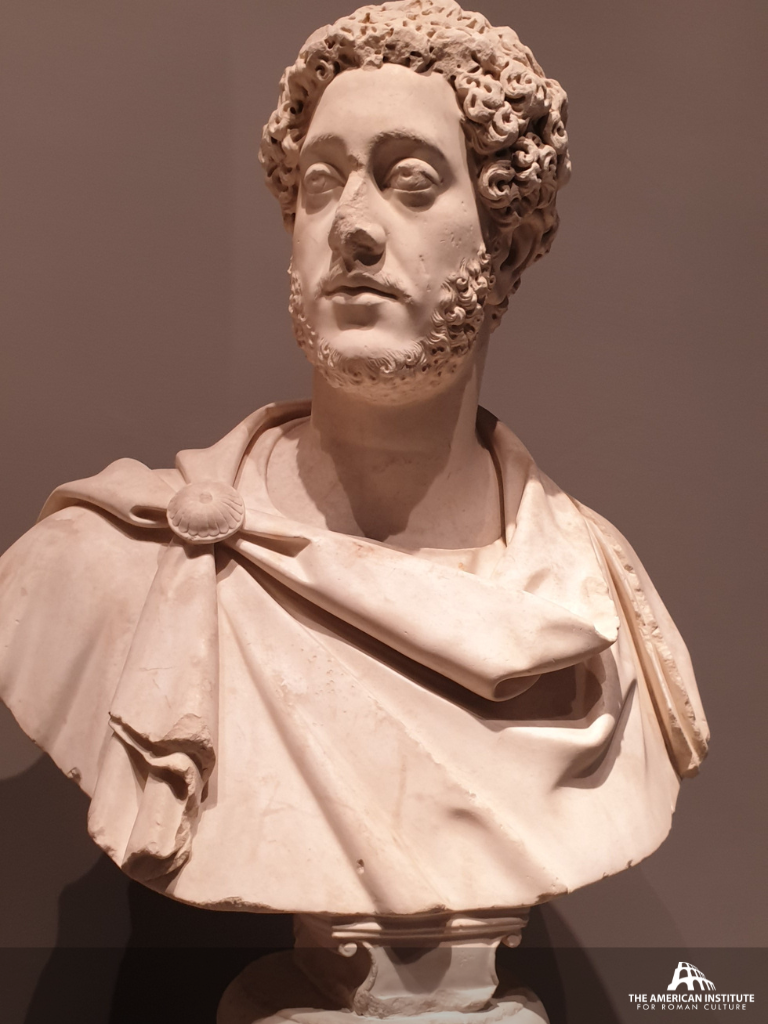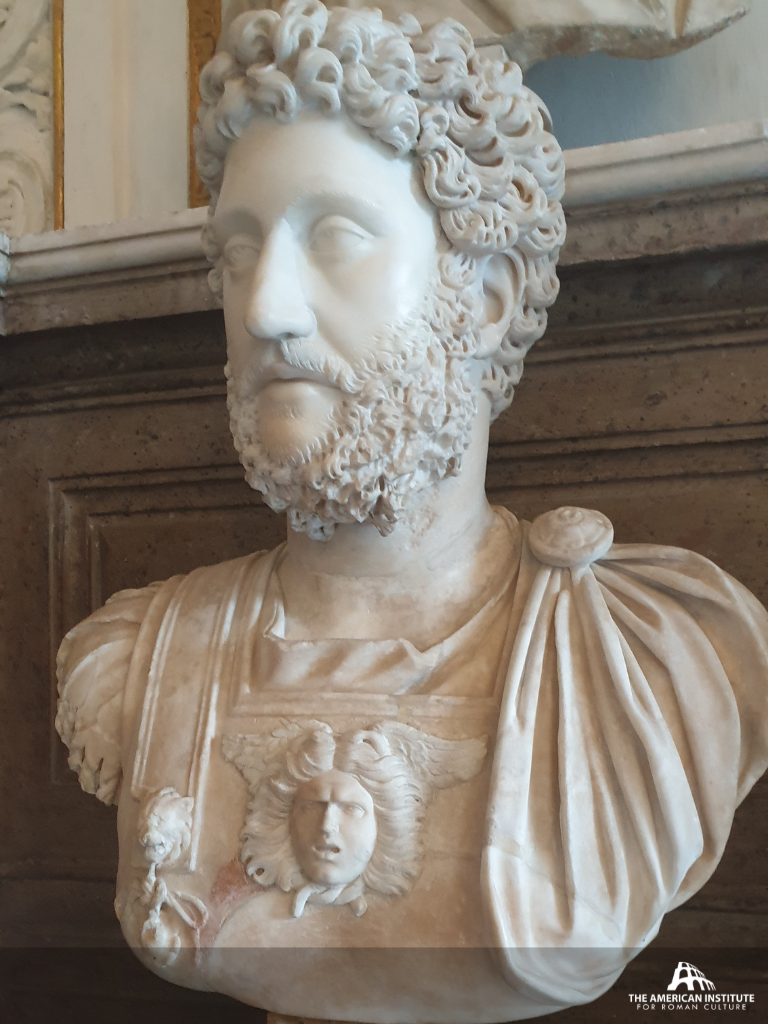Official Name: IMPERATOR MARCUS AURELIUS COMMODUS ANTONINUS AUGUSTUS
Birthdate: August 31, 161 CE.
(Historia Augusta, Life of Commodus, 1)
Birthplace: Lanuvium, Italy.
(Historia Augusta, Life of Commodus, 1)
Reign: Commodus was named emperor in 176 CE, at the age of 15, by his father Marcus Aurelius. Commodus ruled jointly with his father for a period of four years. When Marcus Aurelius died on March 17, 180 CE, Commodus became sole emperor.
(Herodian 1.5.1) (Historia Augusta, Life of Commodus, 2.4)
Marriages:
Bruttia Crispina (178-191 CE)
(Cassius Dio, Roman History, 73.4)
Death: Commodus died on December 31, 192 CE in Rome. He was strangled to death by Narcissus, his wrestling partner.
(Historia Augusta, Life of Commodus, 17) (Cassius Dio, Roman History, 73.22)

Bust of Commodus, Palazzo Massimo, Rome, September 2019

Bust of Commodus, Musei Capitolini, Rome, April 2019
Born in 161 CE, Commodus was the son of emperor Marcus Aurelius and his wife Faustina the Younger. As a child, Commodus received an extensive education under skilled tutors and spent time with the army, joining his father on campaigns against the Germanic tribes. In 176 CE, at just 15 years old, he was named co-emperor, making him the first emperor of the Nerva-Antonine dynasty to inherit the throne by birth rather than adoption. Two years later, he married Bruttia Crispina, the daughter of a prominent consul.
When Marcus Aurelius died in 180 CE, Commodus became sole ruler of the Roman Empire. His reign began with high expectations, as he had just negotiated peace with the Germanic tribes, bringing an end to the war on the Danube. His return to Rome was marked by a grand triumphal procession, but the optimism surrounding his rule quickly faded. Despite his education and upbringing, Commodus showed little interest in governing and instead delegated power to corrupt officials. He withdrew from political affairs, preferring a life of indulgence and excess. He alienated the Senate and Roman elite with heavy taxation, megalomania, and arbitrary executions.
By 182 CE, plots to assassinate Commodus had begun to form, with the first led by his own sister, Lucilla. The plot failed, and Commodus had Lucilla executed, but his paranoia only grew. His behavior became increasingly erratic, and he began to see himself as a divine figure. He participated in gladiatorial combat, fighting both animals and human adversaries in the Colosseum. He also styled himself after the mythical hero Hercules, often appearing dressed in a lion’s skin and carrying a club. In an extreme display of self-worship, he renamed the months of the year after himself and demanded to be recognized as a living god.
In 191 CE, a devastating fire destroyed large parts of Rome, giving Commodus an opportunity to further elevate his own status. As he initiated rebuilding efforts, he proclaimed himself the “new Romulus,” renamed Rome Colonia Commodiana (colony of Commodus), and called its citizens Commodianus (people of Commodus).
On December 31, 192 CE, a conspiracy finally succeeded in ending Commodus’ reign. The plot was organized by his mistress, Marcia, after she found her name on a list of people marked for execution. That evening, while Commodus was bathing, he was strangled by his wrestling partner Narcissus.
After his death, the Senate condemned Commodus’ memory. Although he was allowed to be buried in the Mausoleum of Hadrian, his statues were defaced and his name was erased from public records and monuments. Commodus’ death marked the end of the Nerva-Antonine dynasty and the beginning of a period of chaos known as the Year of the Five Emperors. His successor, Pertinax, ruled for only 87 days before being assassinated by the Praetorian Guard. The empire remained in turmoil until Septimius Severus seized control in 193 CE.
Three years after his death, Commodus’ memory was restored by Septimius Severus. To curry favor with the family of Marcus Aurelius and link himself to the Nerva-Antonine dynasty, Commodus was deified.
177
(Historia Augusta, Life of Marcus Aurelius, 22)
192
(Cassius Dio, Roman History, 73.18-19)
192
(Historia Augusta, Life of Commodus, 8-10)
192
(Historia Augusta, Life of Commodus, 17-19)
This content is brought to you by The American Institute for Roman Culture, a 501(C)3 US Non-Profit Organization.
Please support our mission to aid learning and understanding of ancient Rome through free-to-access content by donating today.
Cite This Page
Cite this page as: Darius Arya, The American Institute for Roman Culture, “Commodus,” Ancient Rome Live. Last modified 2/2/2025. https://ancientromelive.org/Commodus/
License
Created by The American Institute of Roman Culture, published on 12/11/2022 under the following license: Creative Commons: Attribution-NonCommercial-ShareAlike. This license lets others remix, tweak, and build upon this content non-commercially, as long as they credit the author and license their new creations under the identical terms. Please note that content linked from this page may have different licensing terms.

